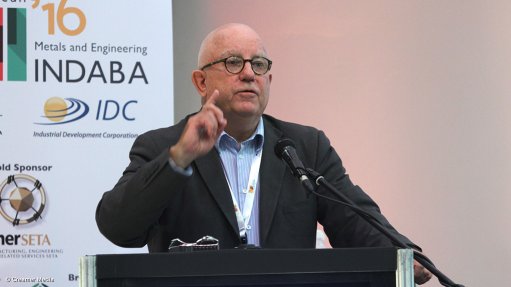
DTI deputy director-general for industrial policy Garth Strachan
Photo by: Duane Daws
Government would, within weeks, finalise a “fair pricing” agreement with steel producer ArcelorMittal South Africa (AMSA) and establish a “steel committee” to monitor implementation of the formula, which would be based on a basket of selling prices in Europe, Asia and North America.
Department of Trade and Industry deputy director-general for industrial policy Garth Strachan said the committee would comprise government officials as well as industry experts and, besides pricing, would also monitor the “other reciprocal conditions” agreed to by AMSA in return for protection. These related to investment, production, maintenance and employment.
The committee was being formed against growing criticism – led by some steel-intensive firms, but also voiced by the opposition Democratic Alliance (DA) – about several recent steel price hikes, which had followed in the wake of the institution of protection on steel products.
AMSA had applied for, and received, protection across ten product categories, with 10% duties already applying on eight of those categories. In addition, it had applied to the International Trade Administration Commission of South Africa for safeguard duties on several products, including hot-rolled coil, which made up a large portion of current imports.
It had subsequently announced four price increases since the start of the year, which had led DA deputy shadow minister for trade and industry Dean Macpherson to argued that government was allowing AMSA to renege on its deal with government regarding pricing.
Speaking at the Metals and Engineering Indaba in Johannesburg on Thursday, Macpherson argued that AMSA had received the protection on the basis of a commitment that it would not raise domestic steel prices – a promise it had since broken.
Strachan said he was unaware of any agreement, noting that government and AMSA were yet to conclude their negotiations on the pricing formula.
“Part of the function of the steel committee is to ensure that, with AMSA, we reach agreement on pricing . . . [and] that we don’t return to import parity pricing. That is, in a nutshell, the deal that we have to strike.”
AMSA acting CEO Dean Subramanian added that the company had never promised not to raise prices, but had instead committed not to factor in protection when making price adjustments.
He indicated that, under the proposed regulated model, domestic prices would be based on selling prices in a range of other countries with the basket comprising countries in Europe (50%), Asia (30%) and North America (20%).
AMSA was already pricing its flat steel using the model, despite having not formally reached agreement with government on the basket.
The company was also keen for locally produced steel to be “designated” for procurement by State-owned companies and departments, and for the current deeming of foreign steel and “local” to be reversed.
Strachan said government was ready to remove the current “deeming” of foreign steel, a strategy that was pursued as a result of government unhappiness with AMSA’s persistent use of import parity pricing to set domestic prices.
“In future, all designations will stipulate that only steel produced in South Africa will be considered to be local.”
The DTI was also preparing to designate further steel-intensive products for local procurement in addition to the 15 that had already been designated under the Preferential Procurement Policy Framework Act.
“We’ve got to raise aggregate demand for steel,” Strachan said, noting that many other countries were pursuing ‘buy local’ strategies to protect their steel industries in the face of the global glut.
AMSA estimated global overcapacity to be 240-million tons and warned that it would take time before China reduced its capacity, despite large losses by that country’s steelmakers.
However, Scaw Metals CEO Markus Hannemann urged government to go even further and designate all products to local procurement, unless it could be shown that such products cannot be produced locally.
He added that the private sector should also embrace local procurement, lamenting the rising levels of importation, with companies seemingly “oblivious” to what is available locally.